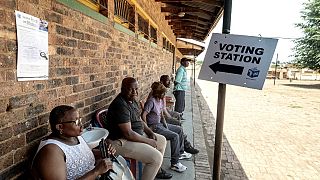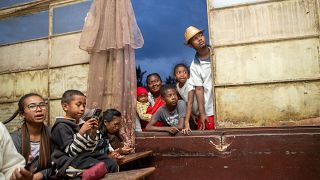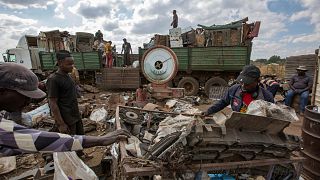Zimbabwe
As Zimbabwe battles a deadly cholera outbreak in its capital Harare, patients are being treated in Kuwadzana, the epicentre of the crisis.
On Friday, authorities declared a state of emergency in Harare, a city of 1.5 million people where 13 deaths have been reported so far. Across the country, there have been 150 deaths and more than 7,000 suspected cholera cases since the outbreak began in February.
Half of the deaths in the capital have occurred in the densely-populated area of Kuwadzana, according to Zimbabwe's health minister Dr Douglas Mombeshora.
Frequent outbreaks
Cholera outbreaks are a frequent occurrence in the country's cities where supplies of clean water and sanitation facilities are often limited due and infrastructure has collapsed due to years of neglect.
In 2008, a cholera outbreak claimed at least 4,000 lives, with at least 100,000 cases.
More recently, in 2018, outbreaks of cholera and typhoid led the government to ramp up its vaccination efforts.
Contaminated drinking water
The disease is caused by the bacterium Vibrio cholerae which is generally transmitted through contaminated food and water.
It can be treated with an oral rehydration solution, to replace the fluids and salts lost to diarrhoea and vomiting.
President Emmerson Mnangagwa, who was re-elected in August for a second term, has promised to revitalise the country's economy and infrastructure. In June, he pledged a nationwide borehole-drilling programme.
"We are building roads and dams and recently we started installing solar boreholes in every village across the country," Mnangagwa said.
In highly-populated areas liked Kuwadzana, drinking water is often contaminated.
"People have dug wells close to pit latrines, especially in mushrooming settlements and other suburbs which do not have running water. This means their drinking water is contaminated," Harare's mayor Ian Makone said.
According to Makone, local authorities, the health ministry and aid groups have now joined forces to double the supply of water in areas affected by the current outbreak.












Go to video
Zimbabwe court rejects opposition bid to block Gukurahundi massacre hearings
02:19
South African actor Embeth Davidtz makes directorial debut with Rhodesia-set drama
01:37
Sudan faces rapidly-spreading cholera outbreak, 1000 daily cases in capital
Go to video
To avoid conflicts with locals, Zimbabwe tracks elephants with GPS
Go to video
Cholera outbreak in Angola kills nearly 600 people
Go to video
Putin hosts talks with African leaders on security